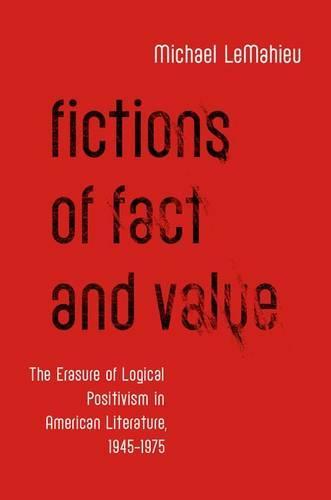Full Product Details
Author: Michael LeMahieu (Associate Professor of English, Associate Professor of English, Clemson University)
Publisher: Oxford University Press Inc
Imprint: Oxford University Press Inc
Dimensions:
Width: 23.60cm
, Height: 2.50cm
, Length: 16.30cm
Weight: 0.502kg
ISBN: 9780199890408
ISBN 10: 0199890404
Pages: 256
Publication Date: 05 December 2013
Audience:
College/higher education
,
Undergraduate
,
Postgraduate, Research & Scholarly
Format: Hardback
Publisher's Status: Active
Availability: To order

Stock availability from the supplier is unknown. We will order it for you and ship this item to you once it is received by us.
Reviews
Erudite, lucid, rigorous-indeed fearless-in its engagement with Wittgenstein, Adorno, Carnap and others, commanding in its analytic precision and range of reference, Fictions of Fact and Value offers an account of the philosophic texture of postwar American literature that is eye-opening, absorbing, and utterly persuasive, worthy of being compared to the deservedly admired The Program Era by Mark McGurl. Michael LeMahieu's book is an altogether remarkable debut. --Ross Posnock, Columbia University Who would have thought that logical positivism would prove more important for understanding post-1945 fiction than postmodernism! The brilliance of LeMahieu's account hinges on his elegant portrayal of the role Wittgenstein's Tractatus played not just in the development of logical positivism but also in prefiguring the various 'tactics of aesthetic negativism developed by postwar writers.' A must-read for anyone interested in Literature and Philosophy. --Steven Meyer, Washington University
[A] revealing monograph on the unsuspected shadow cast by logical positivism on post-war American fiction.... --American Literature Erudite, lucid, rigorous-indeed fearless-in its engagement with Wittgenstein, Adorno, Carnap and others, commanding in its analytic precision and range of reference, Fictions of Fact and Value offers an account of the philosophic texture of postwar American literature that is eye-opening, absorbing, and utterly persuasive, worthy of being compared to the deservedly admired The Program Era by Mark McGurl. Michael LeMahieu's book is an altogether remarkable debut. --Ross Posnock, Columbia University Who would have thought that logical positivism would prove more important for understanding post-1945 fiction than postmodernism! The brilliance of LeMahieu's account hinges on his elegant portrayal of the role Wittgenstein's Tractatus played not just in the development of logical positivism but also in prefiguring the various 'tactics of aesthetic negativism developed by postwar writers.' A must-read for anyone interested in Literature and Philosophy. --Steven Meyer, Washington University
Erudite, lucid, rigorous-indeed fearless-in its engagement with Wittgenstein, Adorno, Carnap and others, commanding in its analytic precision and range of reference, Fictions of Fact and Value offers an account of the philosophic texture of postwar American literature that is eye-opening, absorbing, and utterly persuasive, worthy of being compared to the deservedly admired The Program Era by Mark McGurl. Michael LeMahieu's book is an altogether remarkable debut. * Ross Posnock, Columbia University *
Erudite, lucid, rigorous-indeed fearless-in its engagement with Wittgenstein, Adorno, Carnap and others, commanding in its analytic precision and range of reference, Fictions of Fact and Value offers an account of the philosophic texture of postwar American literature that is eye-opening, absorbing, and utterly persuasive, worthy of being compared to the deservedly admired The Program Era by Mark McGurl. Michael LeMahieu's book is an altogether remarkable debut. Ross Posnock, Columbia University
Author Information
Michael LeMahieu is Assistant Professor of English at Clemson University.




